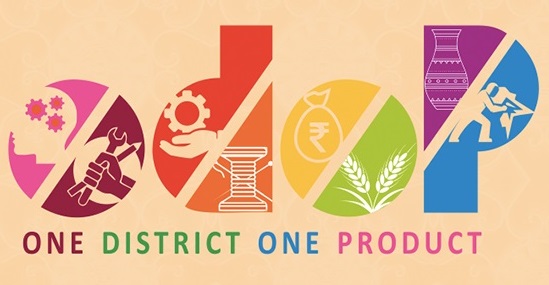Context-
The ODOP initiative integrates small businesses and rural farmers into e-commerce platforms, enhancing their visibility. For instance, the Tribal Cooperative Marketing Development Federation of India promotes tribal products in urban markets, fostering exports and grassroots livelihoods. With 137 unique products endorsed across 713 districts, ODOP boosts local economies and aligns with India's self-reliance and global engagement goals under the Aatmanirbhar Bharat initiative.
Progress of ODOP Scheme
- The PMFME scheme, with its flagship 'One District One Product (ODOP)' intervention, facilitates scale benefits in input management, common services, and local product marketing in the food processing sector.
|
Pradhan Mantri Formalisation of Microfood Processing Enterprises (PMFME)
|
- Key objectives of the PMFME scheme via ODOP include: (a) providing financial assistance for technological upgrades to micro food processing entrepreneurs, (b) capacity building through skill training and technical support, (c) aiding Farmer Producer Organizations (FPOs), Self-Help Groups (SHGs), and Cooperatives, and (d) formalizing informal entities into registered agri-based businesses.
- Under the ODOP scheme, the Government of India approved 137 unique products in 713 districts across 35 States and Union Territories, laying the groundwork for value chain development and support infrastructure alignment.
- Through branding and marketing support, FPOs, SHGs, and Cooperatives serving as 'Special Purpose Vehicles' for ODOP-based micro food processing enterprises receive assistance for market research, product standardization, packaging, quality control, warehousing, and retail sales.
- The scheme supports clusters and groups throughout their value chain, encompassing sorting, grading, storage, processing, packaging, and marketing of various agricultural products.
- India boasts a diverse range of products including rice, maize, spices, turmeric, coconut, mushroom, mango, banana, honey, milk, apple, bakery products, and Mizo chili, reflecting regional diversity and usage.
- The ODOP intervention facilitates the onboarding of sellers onto e-commerce platforms, enhancing visibility for small businesses and rural farmers, with TRIFED promoting tribal products in various markets and supporting exports.
- Districts and states play a crucial role in making India an export powerhouse, aligning with the vision of 'Vocal for Local' and 'Atmanirbhar Bharat', fostering awareness and commitment at the district level to establish new markets.
- As of January 14, 2024, around 70,286 loans have been sanctioned under the PMFME Scheme, with the top-performing states being Maharashtra, Bihar, Tamil Nadu, Uttar Pradesh, and Telangana.
- The scheme provides capital subsidy and credit linkage for individual micro-enterprises, as well as credit-linked grants for clusters and groups like FPOs, SHGs, and cooperatives.
- Seed capital is provided to SHGs processing food products for working capital and to purchase capital goods, while credit-linked grants aid in building common infrastructure.
- Additionally, 50% of branding and marketing expenditure is funded through the scheme.
- ODOP facilitates balanced regional development, improving backward and forward linkages of identified products and contributing to socio-economic development nationwide.
The initiative is widely adopted across states/UTs to unlock the true potential of each district in terms of export contribution and national income, establishing brand identity and positioning for local products.
Value Chain Development, Infrastructure and Marketing Support
- Common Infrastructure: The ODOP scheme provides access to common infrastructure facilities in rural areas for FPOs, SHGs, and cooperatives, while private enterprises can utilize these facilities on a hiring basis. This includes sorting, grading, warehousing, and cold storage for ODOP products. Credit-linkage grants of 35% are available to promote the development of common infrastructure, recognizing its value in the value chain.
- Development of Clusters: Clusters for ODOP products can span across one or multiple districts, facilitating value chain development and alignment of support infrastructure. These products encompass perishable items, agri-based products, cereals, and value-added products. The scheme strengthens both forward and backward linkages, offering common facilities, skill training, incubation centers, research, development, marketing, and branding.
- Value Addition: The cluster-based approach adopted by states/UTs prevents wastage, facilitates processing, and enhances the marketing ecosystem for ODOP products, adding value and ensuring effective access to customers.
- Branding and Marketing: Strong branding and marketing support are crucial for making ODOP products accessible to consumers. The scheme emphasizes common branding, packaging, and standards, tailored to district, regional, or state levels, determined by State Nodal Agencies. Support for branding and marketing is provided within permitted expenditures.
- Institutional Architecture: ODOP project establishes committees at district, state, and national levels, ensuring proper planning, execution, and monitoring through a robust institutional framework. Project Management Units (PMUs) comprising experts and consultants guide State Nodal Agencies, State Level Approval Committee, District Level Committee, and Project Executive Committee, fostering viable, valuable, and sustainable development processes.
ODOP Opportunities and Benefits
- ODOP scheme benefits local communities by fostering employment, empowering rural demographics, and improving livelihoods.
- It preserves local practices, fosters self-reliant ecosystems, and provides training for localized entrepreneurship.
- Promoting exports and supporting 'Aatmanirbhar Bharat', it contributes to inclusive development.
- Digital ODOP GIS maps aid in identifying resources for growth.
- Challenges include underutilization of cold chain infrastructure and uneven distribution of resources across districts.
Conclusion-
The success of 'Democracy and Swaraj' relies on effective planning and reaching every corner of society, achieved through initiatives like ODOP under PMFME. ODOP enhances value chains for various products and has earned praise for its bottom-up approach, contributing significantly to India's integrated development.
Recognized for its role in unlocking district potential, fostering local employment, and driving economic growth, ODOP is a flagship initiative of inclusive development. India's journey towards a stronger economy involves robust public policy support, improved infrastructure, and effective implementation of ODOP to achieve the goal of 'Atmanirbhar Bharat'.
|
Probable Questions for UPSC Mains Exam- 1. How does the One District One Product (ODOP) initiative contribute to India's goal of self-reliance and global engagement? (10 Marks, 150 Words) 2. What are the key components of the ODOP scheme under the PMFME, and how do they support value chain development and local entrepreneurship? (15 Marks, 250 Words) |
Source- The Indian Express









